实验3
Task1
(1)

1 #pragma once 2 #include <iostream> 3 #include <string> 4 class Button { 5 public: 6 Button(const std::string &label_); 7 const std::string& get_label() const; 8 void click(); 9 private: 10 std::string label; 11 }; 12 Button::Button(const std::string &label_): label{label_} { 13 } 14 inline const std::string& Button::get_label() const 15 { 16 return label; 17 } 18 inline void Button::click() 19 { 20 std::cout << "Button '" << label << "' clicked\n"; 21 }

1 #include <iostream> 2 #include <vector> 3 #include <algorithm> 4 #include "button.hpp" 5 // 窗口类 6 class Window{ 7 public: 8 Window(const std::string &title_); 9 void display()const; 10 void close(); 11 void add_button(const std::string &label); 12 void click_button(const std::string &label); 13 14 private: 15 bool has_button(const std::string &label)const; 16 17 private: 18 std::string title; 19 std::vector<Button>buttons; 20 }; 21 22 Wondow::window(const std::string &title_):title{title_} 23 { 24 buttons.push_back(Button("close")); 25 } 26 27 inline void Window::display()const{ 28 std::string s(40,'*'); 29 std::cout<<s<<std::endl; 30 std::cout<<"window:"<<title<<std::endl; 31 int cnt=0; 32 for(const auto &button:buttons) 33 std::cout<<++cnt<<"."<<button.get_label()<<std::endl; 34 std::cout<<s<<std::endl; 35 } 36 37 inline void Window::close() { 38 std::cout << "close window '" << title << "'" << std::endl; 39 click_button("close"); 40 } 41 42 inline bool Window::has_button(const std::string &label) const { 43 for(const auto &button: buttons) 44 if(button.get_label() == label) 45 return true; 46 47 return false; 48 } 49 inline void Window::add_button(const std::string &label) { 50 if(has_button(label)) 51 std::cout << "button " << label << " already exists!\n"; 52 else 53 buttons.push_back(Button(label)); 54 } 55 inline void Window::click_button(const std::string &label) { 56 for(auto &button:buttons) 57 if(button.get_label() == label) { 58 button.click(); 59 return; 60 } 61 62 std::cout << "no button: " << label << std::endl; 63 }

1 #include "window.hpp" 2 #include <iostream> 3 void test(){ 4 Window w("Demo"); 5 w.add_button("add"); 6 w.add_button("remove"); 7 w.add_button("modify"); 8 w.add_button("add"); 9 w.display(); 10 w.close(); 11 } 12 int main() { 13 std::cout << "用组合类模拟简单GUI:\n"; 14 test(); 15 }
(2)运行结果
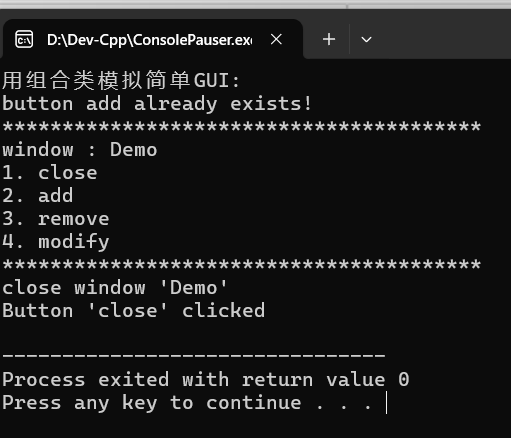
(3)回答问题
① 是组合关系。因为在Window类中std::vector<Button>buttons;
②a.优点:方便调用。
缺点:容易泄露。
b.看用户需求。需要直接调用的用public,需要防止数据的泄露用private。
③接口一比接口二的性能好,效率高,但接口二比接口一安全性好。
④可以正常运行,原来的写法是先构造一个临时Button对象,再将其拷贝到vector中,而改写的写法是直接在vector的内存空间中构造Button对象,省去了临时对象的创建和拷贝过程。
task2
(1)

1 #include <iostream> 2 #include <vector> 3 void test1(); 4 void test2(); 5 void output1(const std::vector<int> &v); 6 void output2(const std::vector<int> &v); 7 void output3(const std::vector<std::vector<int>>& v); 8 int main() { 9 std::cout << "深复制验证1: 标准库vector<int>\n"; 10 test1(); 11 std::cout << "\n深复制验证2: 标准库vector<int>嵌套使用\n"; 12 test2(); 13 } 14 void test1() { 15 std::vector<int> v1(5, 42); 16 const std::vector<int> v2(v1); 17 v1.at(0) = -1; 18 std::cout << "**********拷贝构造后**********\n"; 19 std::cout << "v1: "; output1(v1); 20 std::cout << "v2: "; output1(v2); 21 std::cout << "**********修改v1[0]后**********\n"; 22 std::cout << "v1: "; output1(v1); 23 std::cout << "v2: "; output1(v2); 24 } 25 void test2() { 26 std::vector<std::vector<int>> v1{{1, 2, 3}, {4, 5, 6, 7}}; 27 const std::vector<std::vector<int>> v2(v1); 28 std::cout << "**********拷贝构造后**********\n"; 29 std::cout << "v1: "; output3(v1); 30 std::cout << "v2: "; output3(v2); 31 v1.at(0).push_back(-1); 32 std::cout << "**********修改v1[0]后**********\n"; 33 std::cout << "v1: \n"; output3(v1); 34 std::cout << "v2: \n"; output3(v2); 35 } 36 // 使用xx.at()+循环输出vector<int>数据项 37 void output1(const std::vector<int> &v) { 38 if(v.size() == 0) { 39 std::cout << '\n'; 40 return; 41 } 42 std::cout << v.at(0); 43 for(auto i = 1; i < v.size(); ++i) 44 std::cout << ", " << v.at(i); 45 std::cout << '\n'; 46 } 47 // 使用迭代器+循环输出vector<int>数据项 48 void output2(const std::vector<int> &v) { 49 if(v.size() == 0) { 50 std::cout << '\n'; 51 return; 52 } 53 auto it = v.begin(); 54 std::cout << *it; 55 for(it = v.begin()+1; it != v.end(); ++it) 56 std::cout << ", " << *it; 57 std::cout << '\n'; 58 } 59 // 使用auto for分行输出vector<vector<int>>数据项 60 void output3(const std::vector<std::vector<int>>& v) { 61 if(v.size() == 0) { 62 std::cout << '\n'; 63 return; 64 } 65 for(auto &i: v) 66 output2(i); 67 }
(2)运行结果
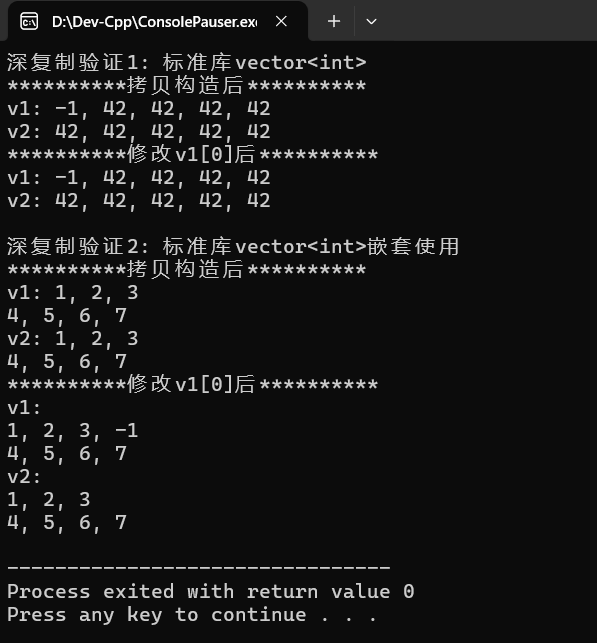
(3)回答问题
①第一行构造了一个包含5个元素的vector,每个元素值为42。第二行是用v1的内容创建一个新的vector v2。v1包含5个值为42的数据项,v2也有5个。
②v1.size()是2,v2.size()是2,v3.size()是3。
③可以实现同等效果,v1.at()=-1越界会报错,v1[0]=-1越界可能崩溃或数据错误。
④a.可以输出-1。
b.优势:数据的安全性强。劣势:只能读取,不能修改。
⑤a.是深复制。
b.返回值分别为int类型、const int&类型。必须提供带const修饰的重载版本。
task3
(1)

1 #pragma once 2 #include <iostream> 3 // 动态int数组对象类 4 class vectorInt{ 5 public: 6 vectorInt(); 7 vectorInt(int n_); 8 vectorInt(int n_, int value); 9 vectorInt(const vectorInt &vi); 10 ~vectorInt(); 11 int size() const; 12 int& at(int index); 13 const int& at(int index) const; 14 vectorInt& assign(const vectorInt &vi); 15 int* begin(); 16 int* end(); 17 const int* begin() const; 18 const int* end() const; 19 private: 20 int n; 21 // 当前数据项个数 22 int *ptr; // 数据区 23 }; 24 vectorInt::vectorInt():n{0}, ptr{nullptr} { 25 } 26 vectorInt::vectorInt(int n_): n{n_}, ptr{new int[n]} { 27 } 28 vectorInt::vectorInt(int n_, int value): n{n_}, ptr{new int[n_]} { 29 for(auto i = 0; i < n; ++i) 30 ptr[i] = value; 31 } 32 vectorInt::vectorInt(const vectorInt &vi): n{vi.n}, ptr{new int[n]} { 33 for(auto i = 0; i < n; ++i) 34 ptr[i] = vi.ptr[i]; 35 } 36 vectorInt::~vectorInt() { 37 delete [] ptr; 38 } 39 int vectorInt::size() const { 40 return n; 41 } 42 const int& vectorInt::at(int index) const { 43 if(index < 0 || index >= n) { 44 std::cerr << "IndexError: index out of range\n"; 45 std::exit(1); 46 } 47 return ptr[index]; 48 } 49 int& vectorInt::at(int index) { 50 if(index < 0 || index >= n) { 51 std::cerr << "IndexError: index out of range\n"; 52 std::exit(1); 53 } 54 return ptr[index]; 55 } 56 vectorInt& vectorInt::assign(const vectorInt &vi) { 57 if(this == &vi) 58 return *this; 59 int *ptr_tmp; 60 ptr_tmp = new int[vi.n]; 61 for(int i = 0; i < vi.n; ++i) 62 ptr_tmp[i] = vi.ptr[i]; 63 delete[] ptr; 64 n = vi.n; 65 ptr = ptr_tmp; 66 return *this; 67 } 68 int* vectorInt::begin() { 69 return ptr; 70 } 71 int* vectorInt::end() { 72 return ptr+n; 73 } 74 const int* vectorInt::begin() const { 75 return ptr; 76 } 77 const int* vectorInt::end() const { 78 return ptr+n; 79 }

1 #include"vectorInt.hpp" 2 #include <iostream> 3 void test1(); 4 void test2(); 5 void output1(const vectorInt &vi); 6 void output2(const vectorInt &vi); 7 int main() { 8 std::cout << "测试1: \n"; 9 test1(); 10 std::cout << "\n测试2: \n"; 11 test2(); 12 } 13 void test1() { 14 int n; 15 std::cout << "Enter n: "; 16 std::cin >> n; 17 vectorInt x1(n); 18 for(auto i = 0; i < n; ++i) 19 x1.at(i) = (i+1)*10; 20 std::cout << "x1: "; output1(x1); 21 vectorInt x2(n, 42); 22 vectorInt x3(x2); 23 x2.at(0) = -1; 24 std::cout << "x2: "; output1(x2); 25 std::cout << "x3: "; output1(x3); 26 } 27 void test2() { 28 const vectorInt x(5, 42); 29 vectorInt y; 30 y.assign(x); 31 std::cout << "x: "; output2(x); 32 std::cout << "y: "; output2(y); 33 } 34 // 使用xx.at()+循环输出vectorInt对象数据项 35 void output1(const vectorInt &vi) { 36 if(vi.size() == 0) { 37 std::cout << '\n'; 38 return; 39 } 40 std::cout << vi.at(0); 41 for(auto i = 1; i < vi.size(); ++i) 42 std::cout << ", " << vi.at(i); 43 std::cout << '\n'; 44 } 45 // 使用迭代器+循环输出vectorInt对象数据项 46 void output2(const vectorInt &vi) { 47 if(vi.size() == 0) { 48 std::cout << '\n'; 49 return; 50 } 51 auto it = vi.begin(); 52 std::cout << *it; 53 for(it = vi.begin()+1; it != vi.end(); ++it) 54 std::cout << ", " << *it; 55 std::cout << '\n'; 56 }
(2)运行结果
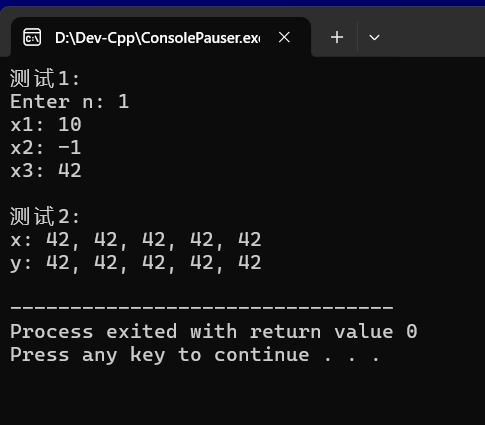
(3)回答问题
①缺少返回值。
②a.static_cast<const vectorInt*>(this)的作用是将非const指针转换为const指针。
转换前this的类型是非const指针,转换后是const指针。
转换目的:保护数据。
b. const_cast<int&>的作用是将const引用转换为非const引用。
转换前的返回值类型为const int&,转换后为int&。
转换目的:使返回值可以修改。
③v1是非const版本,而v2是const版本。
第一个版本是要修改元素时使用,第二个版本是保护数据时使用。
④可行。第一行代码的功能是填充数组。
第二行代码的功能是复制数据到新对象。
第三行代码的功能是安全替换当前对象的数据。
task4
(1)

1 #pragma once 2 // 类Matrix声明 3 class Matrix { 4 public: 5 Matrix(int rows_, int cols_, double value = 0); // 构造rows_*cols_矩阵对象, 初值value 6 Matrix(int rows_, double value = 0); 7 // 构造rows_*rows_方阵对象, 初值value 8 Matrix(const Matrix &x); 9 ~Matrix(); 10 // 深复制 11 void set(const double *pvalue, int size); // 按行复制pvalue指向的数据,要求size=rows*cols,否则报错退出 12 void clear(); // 矩阵对象数据项置0 13 const double& at(int i, int j) const; // 返回矩阵对象索引(i,j)对应的数据项const引用(越界则报错后退出) 14 double& at(int i, int j); // 返回矩阵对象索引(i,j)对应的数据项引用(越界则报错后退出) 15 int rows() const; // 返回矩阵对象行数 16 int cols() const; // 返回矩阵对象列数 17 void print() const; // 按行打印数据 18 private: 19 int n_rows; //矩阵对象内元素行数 20 int n_cols; // 矩阵对象内元素列数 21 double *ptr;// 数据区 22 };

1 #include "matrix.hpp" 2 #include <iostream> 3 #include <cstdlib> 4 #include <cstring> 5 6 // 构造函数:rows_ × cols_ 矩阵 7 Matrix::Matrix(int rows_, int cols_, double value) 8 : n_rows(rows_), n_cols(cols_), ptr(nullptr) { 9 ptr = new double[n_rows * n_cols]; 10 for (int i = 0; i < n_rows * n_cols; ++i) { 11 ptr[i] = value; 12 } 13 } 14 15 // 构造函数:rows_ × rows_ 方阵 16 Matrix::Matrix(int rows_, double value) 17 : n_rows(rows_), n_cols(rows_), ptr(nullptr) { 18 ptr = new double[n_rows * n_cols]; 19 for (int i = 0; i < n_rows * n_cols; ++i) { 20 ptr[i] = value; 21 } 22 } 23 24 // 拷贝构造函数(深拷贝) 25 Matrix::Matrix(const Matrix &x) 26 : n_rows(x.n_rows), n_cols(x.n_cols), ptr(nullptr) { 27 if (x.ptr != nullptr) { 28 ptr = new double[n_rows * n_cols]; 29 std::memcpy(ptr, x.ptr, n_rows * n_cols * sizeof(double)); 30 } 31 } 32 33 // 析构函数 34 Matrix::~Matrix() { 35 delete[] ptr; 36 } 37 38 // 设置矩阵数据 39 void Matrix::set(const double *pvalue, int size) { 40 if (pvalue != nullptr) { 41 std::memcpy(ptr, pvalue, size * sizeof(double)); 42 } 43 } 44 45 // 清空矩阵(所有元素置0) 46 void Matrix::clear() { 47 for (int i = 0; i < n_rows * n_cols; ++i) { 48 ptr[i] = 0.0; 49 } 50 } 51 52 // 常量元素访问 53 const double& Matrix::at(int i, int j) const { 54 return ptr[i * n_cols + j]; 55 } 56 57 // 非常量元素访问 58 double& Matrix::at(int i, int j) { 59 return ptr[i * n_cols + j]; 60 } 61 62 // 返回行数 63 int Matrix::rows() const { 64 return n_rows; 65 } 66 67 // 返回列数 68 int Matrix::cols() const { 69 return n_cols; 70 } 71 72 // 打印矩阵 73 void Matrix::print() const { 74 for (int i = 0; i < n_rows; ++i) { 75 std::cout << ptr[i * n_cols]; 76 for (int j = 1; j < n_cols; ++j) { 77 std::cout << ", " << ptr[i * n_cols + j]; 78 } 79 std::cout << '\n'; 80 } 81 }

1 #include <iostream> 2 #include <cstdlib> 3 #include "matrix.hpp" 4 void test1(); 5 void test2(); 6 void output(const Matrix &m, int row_index); 7 int main() { 8 std::cout << "测试1: \n"; 9 test1(); 10 std::cout << "\n测试2: \n"; 11 test2(); 12 } 13 void test1() { 14 double x[1000] = {1, 2, 3, 4, 5, 6, 7, 8, 9, 10}; 15 int n, m; 16 std::cout << "Enter n and m: "; 17 std::cin >> n >> m; 18 Matrix m1(n, m); // 创建矩阵对象m1, 大小n×m 19 m1.set(x, n*m); // 用一维数组x的值按行为矩阵m1赋值 20 Matrix m2(m, n); // 创建矩阵对象m2, 大小m×n 21 m2.set(x, m*n); // 用一维数组x的值按行为矩阵m1赋值 22 Matrix m3(n); // 创建一个n×n方阵对象 23 m3.set(x, n*n); // 用一维数组x的值按行为矩阵m3赋值 24 25 std::cout << "矩阵对象m1: \n"; m1.print(); 26 std::cout << "矩阵对象m2: \n"; m2.print(); 27 std::cout << "矩阵对象m3: \n"; m3.print(); 28 } 29 void test2() { 30 Matrix m1(2, 3, -1); 31 const Matrix m2(m1); 32 std::cout << "矩阵对象m1: \n"; m1.print(); 33 std::cout << "矩阵对象m2: \n"; m2.print(); 34 m1.clear(); 35 m1.at(0, 0) = 1; 36 std::cout << "m1更新后: \n"; 37 std::cout << "矩阵对象m1第0行 "; output(m1, 0); 38 std::cout << "矩阵对象m2第0行: "; output(m2, 0); 39 } 40 // 输出矩阵对象row_index行所有元素 41 void output(const Matrix &m, int row_index) { 42 if(row_index < 0 || row_index > m.rows()) { 43 std::cerr << "IndexError: row index out of range\n"; 44 std::exit(1); 45 } 46 std::cout << m.at(row_index, 0); 47 for(int j = 1; j < m.cols(); ++j) 48 std::cout << ", " << m.at(row_index, j); 49 std::cout << '\n'; 50 }
(2)运行结果
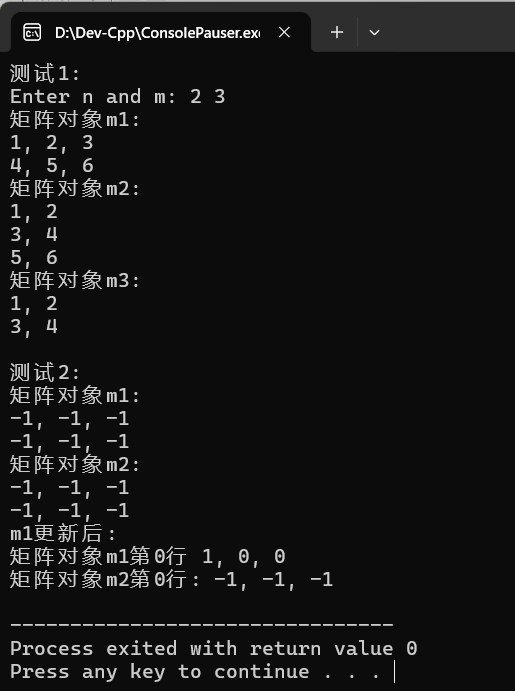
task5
(1)

1 #pragma once 2 #include <iostream> 3 #include <string> 4 5 // 联系人类 6 class Contact { 7 public: 8 Contact(const std::string &name_, const std::string &phone_); 9 const std::string &get_name() const; 10 const std::string &get_phone() const; 11 void display() const; 12 13 private: 14 std::string name; // 必填项 15 std::string phone; // 必填项 16 }; 17 18 Contact::Contact(const std::string &name_, const std::string &phone_) 19 : name(name_), phone(phone_) { 20 } 21 22 const std::string& Contact::get_name() const { 23 return name; 24 } 25 26 const std::string& Contact::get_phone() const { 27 return phone; 28 } 29 30 void Contact::display() const { 31 std::cout << name << ", " << phone; 32 }

1 #pragma once 2 3 #include <iostream> 4 #include <string> 5 #include <vector> 6 #include <algorithm> 7 #include "contact.hpp" 8 9 // 通讯录类 10 class ContactBook { 11 public: 12 void add(const std::string &name, const std::string &phone); // 添加联系人 13 void remove(const std::string &name); // 移除联系人 14 void find(const std::string &name) const; // 查找联系人 15 void display() const; // 显示所有联系人 16 size_t size() const; 17 18 private: 19 int index(const std::string &name) const; // 返回联系人在contacts内索引,如不存在,返回-1 20 void sort(); // 按姓名字典序升序排序通讯录 21 22 private: 23 std::vector<Contact> contacts; 24 }; 25 26 void ContactBook::add(const std::string &name, const std::string &phone) { 27 if(index(name) == -1) { 28 contacts.push_back(Contact(name, phone)); 29 std::cout << name << " add successfully.\n"; 30 sort(); 31 return; 32 } 33 std::cout << name << " already exists. fail to add!\n"; 34 } 35 36 void ContactBook::remove(const std::string &name) { 37 int i = index(name); 38 if(i == -1) { 39 std::cout << name << " not found, fail to remove!\n"; 40 return; 41 } 42 contacts.erase(contacts.begin() + i); 43 std::cout << name << " remove successfully.\n"; 44 } 45 46 void ContactBook::find(const std::string &name) const { 47 int i = index(name); 48 if(i == -1) { 49 std::cout << name << " not found!\n"; 50 return; 51 } 52 contacts[i].display(); 53 std::cout << '\n'; 54 } 55 56 void ContactBook::display() const { 57 for(auto &c: contacts) { 58 c.display(); 59 std::cout << '\n'; 60 } 61 } 62 63 size_t ContactBook::size() const { 64 return contacts.size(); 65 } 66 67 // 待补足1: int index(const std::string &name) const; 实现 68 // 返回联系人在contacts内索引;如不存在,返回-1 69 int ContactBook::index(const std::string &name) const { 70 for (size_t i = 0; i < contacts.size(); ++i) { 71 if (contacts[i].get_name() == name) { 72 return static_cast<int>(i); 73 } 74 } 75 return -1; 76 } 77 78 // 待补足2: void ContactBook::sort(); 实现 79 // 按姓名字典序升序排序通讯录 80 void ContactBook::sort() { 81 std::sort(contacts.begin(), contacts.end(), 82 [](const Contact &a, const Contact &b) { 83 return a.get_name() < b.get_name(); 84 }); 85 }

1 #include "contactBook.hpp" 2 3 void test() { 4 ContactBook contactbook; 5 6 std::cout << "1. add contacts\n"; 7 contactbook.add("Bob", "18199357253"); 8 contactbook.add("Alice", "17300886371"); 9 contactbook.add("Linda", "18184538072"); 10 contactbook.add("Alice", "17300886371"); 11 12 std::cout << "\n2. display contacts\n"; 13 std::cout << "There are "<< contactbook.size() << " contacts.\n"; 14 contactbook.display(); 15 16 std::cout << "\n3. find contacts\n"; 17 contactbook.find("Bob"); 18 contactbook.find("David"); 19 20 std::cout << "\n4. remove contact\n"; 21 contactbook.remove("Bob"); 22 contactbook.remove("David"); 23 } 24 25 int main() { 26 test(); 27 return 0; 28 }
(2)运行结果
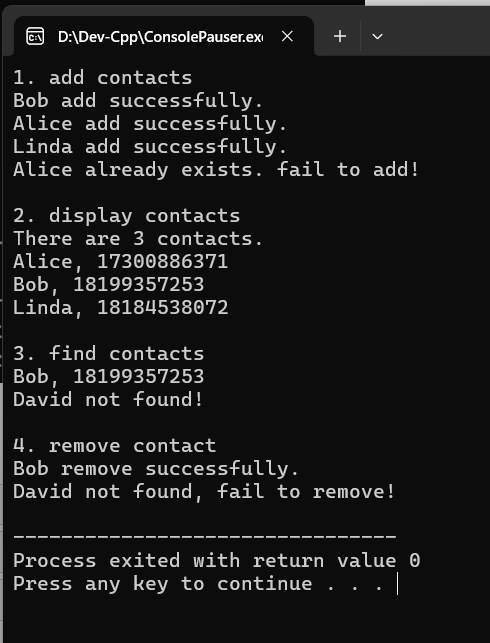





 浙公网安备 33010602011771号
浙公网安备 33010602011771号